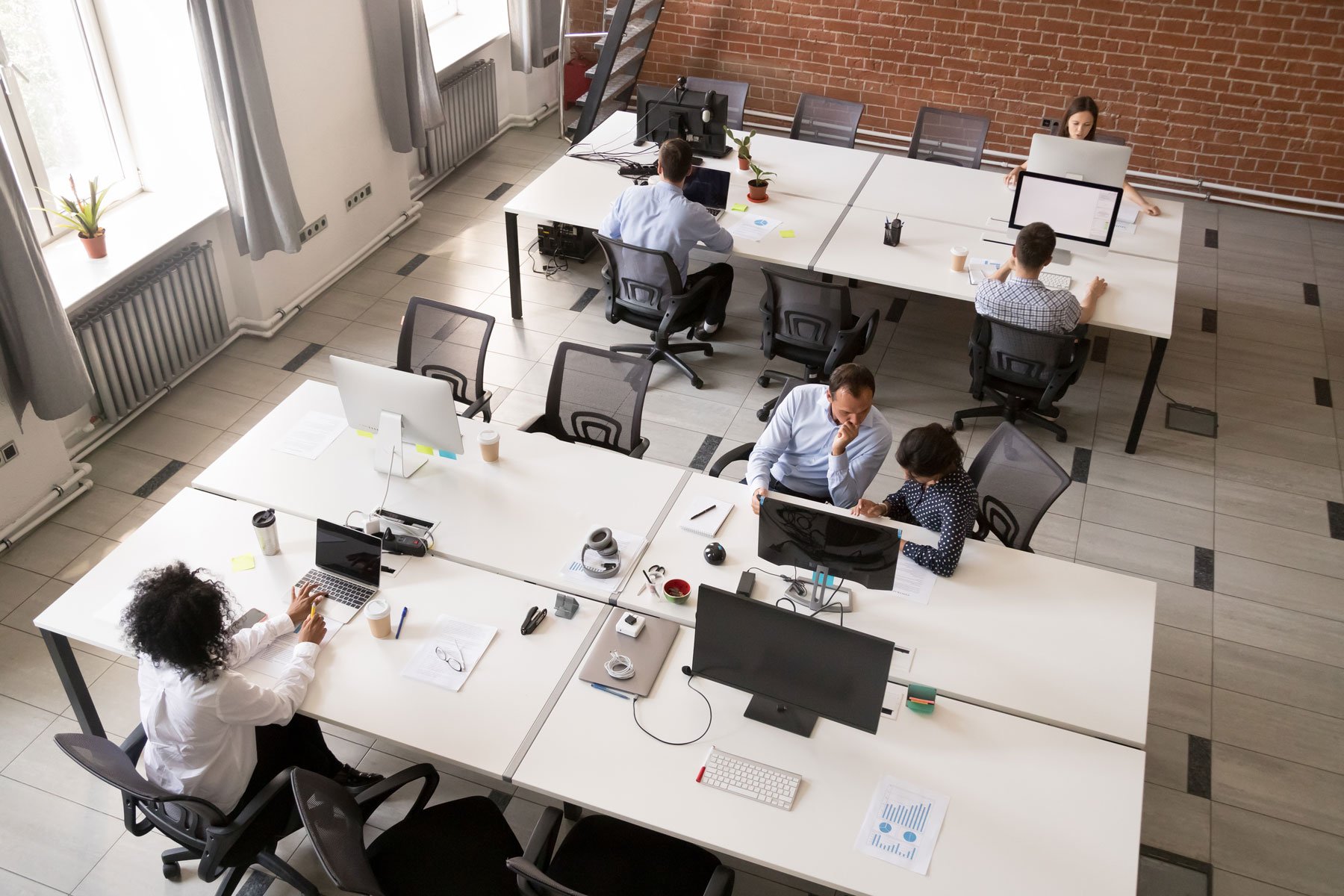5 Common Misconceptions about Hot Desking

"Hot desking” is still a pretty new term and style of working for many businesses and their employees. The practice of desk sharing gives employees the freedom to choose their preferred desk when they are in the office. Whatever you call it, desk sharing, hot desking and desk hotelling are all methods that are now being used to manage hybrid workplaces and employees working in shifts as many businesses look to return to the office.
Desk sharing has gained popularity as part of the hybrid workplace (a working model preferred by 91% of workers). It’s become the workplace arrangement utilized by leading companies like Deloitte, Microsoft, and BMW Group. This research by the BMW Group in Munich, Germany, examined the effect of desk sharing, indicating the positive influence of workplace mobility and flexibility on employee satisfaction.

When done correctly and with the right technology, desk sharing has a proven positive effect on concentration, work productivity, and employee satisfaction.
Whatever you want to call it, hot desking is here to stay. Figures show that a 60% growth in the market size of coworking spaces is expected by 2025 over the current $8.14bn.
The benefits of desk sharing aren’t limited to employees either, it can also be an effective strategy for cutting costs, increasing flexibility, and enhancing workplace communication and collaboration.
However, some worry that the practice will result in low productivity and a lack of organization. You’ve probably heard some of the most common myths:
- Desk sharing isolates me from my team members.
- Sharing desks will stop me from being productive.
- I won't get a desk.
- Collaboration is mandatory if I use a shared desk.
- Sharing desks puts my privacy at risk.
Let’s bust these five common misconceptions about desk sharing and look at the ways it can boost workforce productivity.
1. "Desk sharing isolates me from my team members"
Some employees indeed have concerns about feeling disconnected and isolated. Modern offices implementing hot desking can address this issue by creating a work environment that promotes communication and collaboration. Teamwork benches, designated areas where workers interact—such as meeting rooms and informal meeting zones—are available when they are needed.
Desk sharing facilitates professional socialization and creativity. It fosters establishing new workplace connections and provides the opportunity to enlarge the working circle. Spontaneous workplace collaboration is beneficial for most businesses. Sharing ideas on the fly can help boost productivity within your organization.
In addition, a cloud-based workplace management platform means employees are able to schedule meetings independently and seamlessly.
2. "Sharing desks will stop me from being productive"
It’s a common belief that “hot desks” mean a workspace filled with employees working alone or in groups in a noisy environment. The reality is the opposite. Desk sharing can be designed and managed in a way that allows employees to choose designated work areas that fit their preferences (e.g. selecting a workstation located in a quiet zone to focus more).
"We're starting to notice that office space is not so much about the workspace itself; it's really about making a working community, and for people to have a place that they want to come to, where ideas are nurtured and the future is determined."
Ron Bakker, architect of the Edge, London-based PLP Architecture
Desk sharing gives employees the flexibility to choose where they want to work, depending on the particular requirements of their current tasks. Implementing a desk booking app helps employees easily schedule their bookings, which increases overall productivity and employee satisfaction.
3. "I won't get a desk"
The concept of hot-desking suggests mobility. You might not have the same workstation every day you work in the office, but you can plan ahead to ensure you have access to a desk for when you are.
Luckily, there is technology available to help, SwipedOn Desks can streamline the process of identifying workspace availability. Employees can access information about the capacity of the work area and find a free desk for the hours they need.

Utilizing a desk booking system in conjunction with other workplace technology helps facilitate mundane and manual business processes so employees can concentrate on important productive tasks.
4. "Collaboration is mandatory if I use a shared desk"
At times, collaboration can be an effective strategy. However, the potential benefits of professional interactions depend on the particular stage of project work or task you’re dealing with. Sometimes more private space is needed.
Desk sharing doesn’t force people to collaborate. Using desk-booking software can help workers address this challenge in advance by opting for an appropriate desk spot in advance.
5. "Sharing desks puts my privacy at risk."
Data privacy is an important concern that may give rise to reservations about a hot-desking work arrangement. Shared workspaces typically provide phone call rooms, conference rooms, and breakout zones where you can have conversations with your clients and team members in private.
When not managed properly and without the right tools, hot desking can indeed have a detrimental effect on the business. However, adopting a dedicated desk booking solution can help you address potential privacy and safety issues as well as any employee concerns. Providing guests and employees with a secure contactless booking system helps mitigate privacy and security risk by:
- Giving visibility over who is onsite at what times
- Establishing effective safety practices such as assigning essential workers with a fixed desk that is only available to them.
- Easily identifying key contacts such as fire warden or first aider
The right software solution, and adopting common safety practices, help mitigate risks so your shared workspace is a safe and secure environment that fosters creativity, collaboration, and productivity.








 Germany - Deutsch
Germany - Deutsch